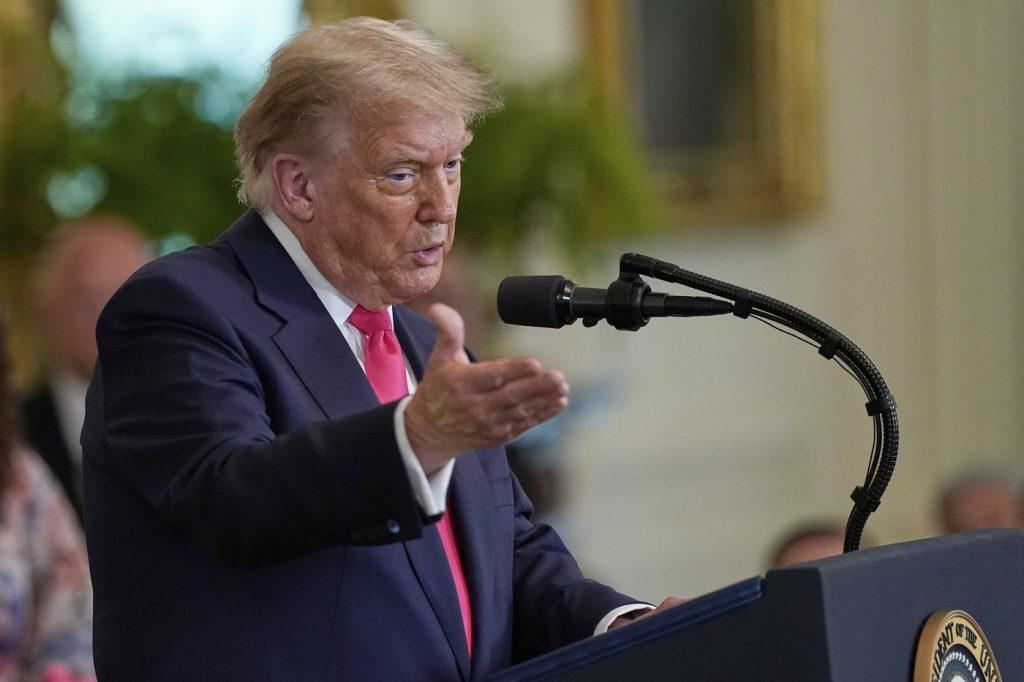On a divided decision, the Supreme Court ruled on Friday that individual judges do not possess the authority to issue nationwide injunctions, granting a significant win to President Donald Trump. This ruling comes as Trump has been vocal about his grievances regarding specific judges who have blocked his administration’s policies. Following the decision, Trump indicated that he plans to "promptly file" to advance polices that had previously been halted, including those concerning birthright citizenship restrictions.
During an hour-long news conference, Trump referenced a productive week for his administration, highlighting U.S. military strikes on Iran, a subsequent ceasefire, and discussions of increased defense spending at the recent NATO summit. He expressed gratitude toward U.S. Attorney General Pam Bondi for her contributions to the Supreme Court case, praising her as "a great attorney general" and emphasizing the week’s accomplishments, particularly the Supreme Court ruling.
In an ongoing discussion about international affairs, Trump remarked on his lack of concern regarding potential secret nuclear sites in Iran, stating that both the U.S. and Israel are “exhausted” and suggesting that Iran’s current focus does not involve nuclear pursuits. He plans to address comments made by Iran's Supreme Leader, Ayatollah Ali Khamenei, who criticized the U.S. after recent tensions.
On diplomatic fronts, the White House is set to host leaders from Congo and Rwanda to finalize a peace agreement intended to end years of ongoing conflict, a development Trump described as a success. He admitted his limited knowledge on the issue but expressed satisfaction that the U.S. played a role in mediating talks.
Trump also addressed the serious nature of his role as president, mentioning threats to his life, including specific risks posed by proxy groups from Iran. He referenced an earlier assassination attempt, noting physical impacts that he sometimes still experiences. His comments underscored the heightened security environment surrounding his presidency.
Amid legislative efforts, President Trump hinted at a possible extension of deadlines pertaining to his tax-and-spending agenda, which he initially aimed to have approved by Congress before the Fourth of July, saying, "It can go longer." He characterized ongoing negotiations with Republican senators as necessary adjustments to progress, acknowledging that adjustments to his legislative priorities would be necessary based on procedural advice from the Senate parliamentarian, Elizabeth McDonough.
The urgency within the administration is prevalent as Treasury Secretary Scott Bessent prepares to meet with Republican lawmakers to solidify Trump’s tax package. Bessent highlighted the need to pass legislation efficiently, asserting that “perfect cannot be the enemy of good” when it comes to advancing Trump's goals.
In a noteworthy acknowledgment, Trump viewed Senator John Fetterman from Pennsylvania as potentially supportive of his legislative agenda, calling him "the most sensible" among Democrats. Following a tumultuous week filled with military action and diplomatic negotiations, Trump also suggested there were opportunities for conversations with Iran, although he did not elaborate on the anticipated nature of those meetings.
As Trump navigates various challenges, including ongoing negotiations on tariffs and international trade agreements—particularly with China—he conveyed optimism about securing beneficial deals for the U.S. commerce, even as inflation concerns lingered domestically. The president alluded to the complexity of trade relations but maintained confidence in the administration's capacity to capture favorable agreements.
Additionally, in a significant pivot from past decisions, the Pentagon announced that a Navy ship, originally named after slain gay rights activist Harvey Milk, would be renamed in honor of World War II hero Navy Chief Petty Officer Oscar V. Peterson. This shift is part of a broader initiative to alter military commemorations under Trump's leadership.
The day concluded with discussions regarding the Justice Department potentially investigating judges whose rulings have been perceived as inhibiting the Trump administration's initiatives. Amid these discussions, Trump’s trajectory looks to refocus on advancing the policies halted by previous court rulings while striving to solidify legislative victories ahead of self-imposed deadlines.











